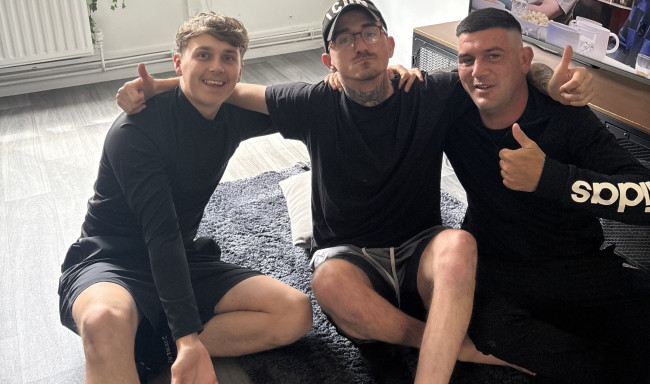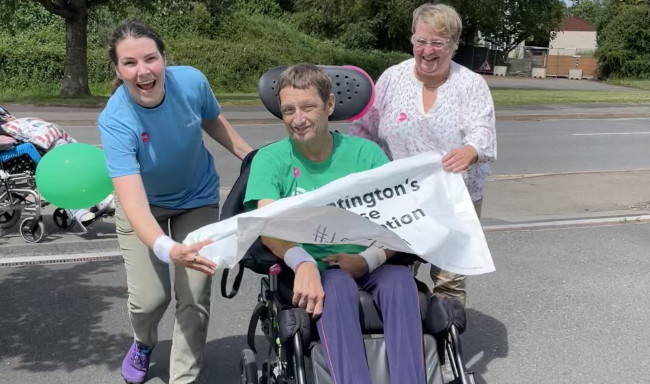We spoke to Alex Fisher, Senior Occupational Therapist about how an Occupational Therapist can support you or your loved one.
Alex Fisher is a Senior Occupational Therapist who specialises in those affected by Huntington's disease. We asked the community if they had any questions for an Occupational Therapist and Alex has kindly answered them for us.
Throughout the answers, Alex has referred to a trusted companion. Not everyone has one but it’s usually a friend/friends or family member/s who can comment on what’s happening to you without you seeing it as judgemental. As the illness can stop some people from understanding they are changing, this person can be very important.
What activities do you suggest someone in the early stages should start doing now to help them keep independent for longer?
Make sure that there’s a balance of different activities such as getting out in nature, activities which challenge you such as learning a new skill but also activities that help you unwind. This sounds obvious but make sure the activity has meaning and purpose. Doing it for the sake of doing it will zap your motivation which can be problematic even early in the disease. If there’s a drop off in the things that you enjoy and you are not getting joy from the things you used to do, check this out with your Huntington's Health Care Professional. This can be a sign of depression and if so, is treatable.
Treat sleep as part of your routine. Sleep is important for the brain to process what’s happened during your day but also a time for it to recharge. Sleep changes happen early in the disease so make sure you talk to your Huntington's Health Care Professional about this."
What role does occupational therapy play in managing Huntington's disease?
"Occupational therapy is about supporting you to continue to participate in the everyday activity you need and want to do. In the same way a physiotherapist will focus on the movement in your everyday activity, an occupational therapist will support you in the doing of that activity. That includes self-care, leisure or work. That includes rehabilitation techniques such as relearning how to do a task, but also altering the environment in which you do it. As Huntington's disease is so complex, it needs a whole range of professionals to support you in this and occupational therapists should liaise with the others in your care."
How can caregivers support someone with Huntington's disease effectively?
"If you are an informal caregiver (caring for a loved one/relative) it's about looking after yourself first and foremost. This is easier said than done as although caregiving is an act of love, it is also relentless and there are so many complex emotions involved. Seek counselling if you can – the ambiguous loss you will going through which may last many years will drain your batteries and create emotional ill health for you.
If you are a paid caregiver, this is about knowing as much good information about the illness as possible and learning it not just about movement. Practical skills such as manual handling can be taught easily. Clear, direct and meaningful communication with the person you are supporting can’t be beat. It’s a very different style of communication. Consistency, structure and routine will reduce frustration/anxiety in the person you are working with. If you talk in abstract language or keep changing the way you do things, it will trigger difficulties.
Both forms of caregiving have to adapt to the disease and the changes that it brings. As the disease advances that’s increasingly important.
Would you recommend using a walking stick from the early days so that they can get used to using it or wait until it's really necessary?
Is there a particular type/make of wheelchair recommended for later stages of Huntington's disease?
So, if a person can still mobilise but they are at risk of falls and get fatigued easily - a normal foldable attendant-propelled chair with a belt can be used. They must be able to transfer into the chair by themselves or with support and be able to sit up and not slump or slide forward. In the UK – a health or social care professional can make a referral to the local wheelchair services where specialist wheelchair therapists (usually Occupational Therapists or Physiotherapists) will make an assessment. These chairs can still be folded and put in the car, but it depends on the health of the person helping them and the size of the car. Don’t forget that you may also need ramps for your home. The wheelchair service will advise you of this.
If the chorea is forceful or a person can’t transfer or keep their position, a different type of wheelchair is needed, and the person may need items such as chest or groin harnesses. An example of this type of chair is called a Rea Azalea. It has much more padding and a tilt-in-space mechanism. This means that the seating position is 90 degrees but is tilted back. It counteracts their inability to sit upright. These chairs are heavy and a person’s lifestyle and those of their companion need to be thought about. It's not just about pushing but about where it needs to be used (house, transport, etc). In the UK, these chairs come through wheelchair services but people with Huntington's disease can be difficult to seat so sometimes complex seating services need to be involved."
What are some good organisation tricks for home life in the early stages? Tricks that help with losing things at home, medicine organisation, general tidiness, eating tips.
Start and keep a calendar or diary. An old-fashioned pin board with a calendar as a visual prompt is great. Keep on top of the basics – dentist and health checks. Start using tech items such as your phone or Alexa for prompts. Having Huntington's is not just about the disease, it’s about keeping well as a whole. If you are in pain, you’re going to be low in mood and your concentration will be poor. The same is true for your whole home environment as it will support independence. Reducing clutter, make space, not moving stuff, and making sure things are the right height and there’s enough light can reduce hazards and support your wellbeing and cognition."
How can occupational therapists help with the social and emotional aspects of the disease?
"Your everyday activity is composed of so many parts. If you stop to think about what’s involved, it’s really complex. When your ability to do those things is impacted by Huntington's disease, an Occupational Therapist will work out with you what might be going wrong and look to address that. In that way, the intervention can help with the emotional aspects of the illness. Social withdrawal is really common because of the latter too so it helps with that."
Occupational Therapists are aware that there’s inequity in access to support services for people with Huntington's disease (and other chronic conditions). Many are involved in advocating for changes in housing, benefits, etc. You might not see them, but they are there as they believe in social justice and human rights.
Thank you so much to Alex for answering those questions for us.




